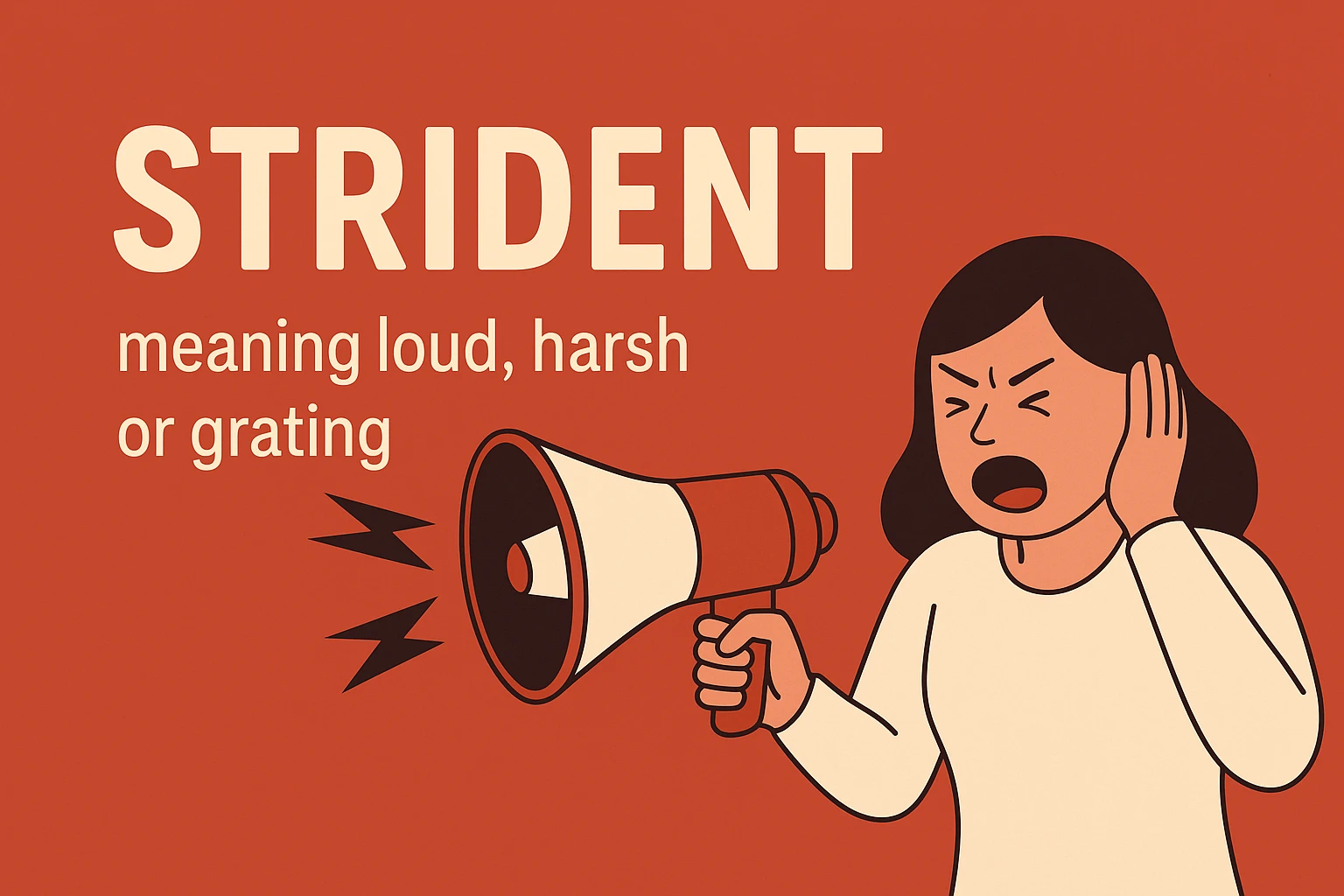Have you ever heard someone speak in a way that felt harsh or demanding? Perhaps their voice was loud, forceful, and almost unpleasant to listen to? If so, you might have encountered someone speaking in a strident manner! Understanding the strident meaning is essential for anyone looking to expand their vocabulary and communicate more effectively.
In this comprehensive guide, we’ll explore everything you need to know about the word “strident” – from its basic definition to real-world examples that will make this concept crystal clear. Whether you’re a student preparing for exams, someone learning English as a second language, or simply curious about expanding your word knowledge, this article is designed just for you! 🎯
What Does Strident Mean? The Basic Definition 📝
The word strident is an adjective that describes sounds, voices, or attitudes that are harsh, loud, and demanding attention in an unpleasant way. When we say something is strident, we mean it’s forceful to the point of being annoying or offensive.
Simple Definition: Strident means harsh, loud, and unpleasantly forceful.
Key characteristics of strident behavior or sounds:
- Loud and piercing 🔊
- Harsh and grating
- Demanding and forceful
- Often unpleasant to hear
- Attention-grabbing in a negative way
Think of nails scratching on a chalkboard – that’s a perfect example of a strident sound! Or imagine someone shouting demands in a very harsh, uncompromising tone – that’s strident behavior.
Strident Meaning in Different Languages 🌍
Understanding how “strident” translates across different languages can help you grasp its meaning better:
Strident meaning in Hindi: तीक्ष्ण (Teekshan) or कर्कश (Karkash)
- तीक्ष्ण means sharp or piercing
- कर्कश means harsh or rough
Strident meaning in Tamil: கடுமையான (Kadumaiyaana) or கர்கசமான (Karkachamaana)
- Both terms convey harshness and severity
Strident meaning in Bengali: কর্কশ (Korkosh) or তীক্ষ্ণ (Tikkhno)
- These words capture the harsh, unpleasant quality of strident sounds
Strident meaning in Telugu: కఠినమైన (Kathhinamaina) or తీక్షణమైన (Theekshnamaina)
- Both terms reflect the harsh, sharp nature of strident expressions
These translations help us understand that across cultures, the concept of harshness and unpleasant forcefulness is universally recognized! 🤝
How to Use Strident in Sentences: Practical Examples 💡
Learning through examples is one of the best ways to understand any word. Here are various ways you can use “strident” in everyday conversation:
Examples with voices and sounds:
- “The teacher’s strident voice echoed through the hallway, making everyone stop and listen.” 📢
- “The alarm clock’s strident beeping woke up the entire neighborhood.”
- “Her strident laughter could be heard from across the restaurant.”
Examples with attitudes and behaviors:
- “The politician’s strident demands for immediate action divided the audience.” 🗳️
- “His strident criticism of the new policy upset many colleagues.”
- “The customer’s strident complaints made other shoppers uncomfortable.”
Examples in writing and communication:
- “The newspaper editorial took a strident tone against the proposed changes.”
- “Her strident writing style often alienated potential readers.” ✍️
Notice how in each example, “strident” describes something that’s not just loud or forceful, but unpleasantly so. It carries a negative connotation that suggests the sound or behavior is harsh and potentially annoying.
Common Synonyms and Antonyms of Strident 🔄
To better understand strident meaning, let’s explore words that have similar and opposite meanings:
Synonyms (words with similar meanings):
- Harsh 😤
- Shrill
- Grating
- Piercing
- Discordant
- Raucous
- Jarring
- Cacophonous
Antonyms (words with opposite meanings):
- Gentle 😊
- Soft
- Melodious
- Soothing
- Pleasant
- Harmonious
- Mellow
- Sweet
Understanding these related words helps you see exactly where “strident” fits in the spectrum of descriptive language. While “loud” might be neutral, “strident” specifically implies that the loudness is unpleasant and harsh.
When and Where to Use Strident Appropriately 🎯
Knowing when to use “strident” correctly is crucial for effective communication. Here’s your guide:
Appropriate contexts for using strident:
In Academic Writing: 📚
- Literature analysis: “The author’s strident critique of social inequality…”
- Political science: “The party’s strident opposition to the bill…”
- Music theory: “The strident notes created tension in the composition…”
In Professional Communication: 💼
- Business reports: “The client’s strident feedback required immediate attention…”
- Performance reviews: “Avoid strident tones when addressing team concerns…”
- Customer service: “The manager handled the strident complaint professionally…”
In Creative Writing: ✨
- Character descriptions: “Her strident personality dominated every conversation…”
- Setting descriptions: “The strident sounds of the city never ceased…”
- Dialogue: “His strident voice cut through the peaceful morning…”
When NOT to use strident:
- Don’t use it to describe genuinely positive loud sounds (like celebration cheers)
- Avoid using it when you simply mean “loud” without the negative connotation
- Don’t apply it to describe constructive criticism that’s delivered respectfully
Tips for Students and English Learners 🎓
If you’re studying English or preparing for exams, here are some practical tips for mastering the word “strident”:
Memory Tricks: 🧠
- Think of “strident” as “student” but replace the “u” with “ri” – imagine a student speaking harshly!
- Remember: STRIdent = STRong + unpleasant
- Connect it with “stride” – someone striding forcefully might also speak stridently
Practice Exercises:
- Write three sentences using “strident” to describe different situations
- Find examples of strident behavior in movies or books
- Practice pronouncing “strident” correctly: STRY-dent 🗣️
Exam Preparation:
- Strident often appears in vocabulary sections of standardized tests
- It’s commonly used in reading comprehension passages about politics or social issues
- Remember both the sound-related and attitude-related meanings
Common Mistakes to Avoid: ⚠️
- Don’t confuse “strident” with “student”
- Don’t use it to describe pleasant loud sounds
- Remember it’s always negative – never use it as a compliment
Conclusion: Mastering the Strident Meaning 🏆
Understanding the strident meaning opens up new possibilities for precise and effective communication. Whether you’re describing an unpleasant sound, a harsh attitude, or forceful criticism, “strident” gives you the perfect word to convey that sense of harsh, unpleasant forcefulness.
Remember these key points:
- Strident always carries a negative connotation 🚫
- It describes both sounds and attitudes
- It’s stronger than just “loud” – it implies harshness
- The word appears across different languages with similar meanings
- Practice using it in various contexts to master its usage
As you continue building your vocabulary, remember that words like “strident” add precision and sophistication to your communication. Whether you’re writing essays, giving presentations, or simply having conversations, understanding nuanced words like this will make you a more effective communicator! 💪
Keep practicing, keep learning, and soon you’ll be using “strident” and other advanced vocabulary words with confidence. Your journey to mastering the English language is ongoing, and every new word you learn, including strident meaning in Hindi, Tamil, Bengali, and Telugu, brings you one step closer to fluency! 🌟
Remember: Great communication starts with understanding the subtle differences between similar words. Now that you know what strident means, you’re better equipped to choose exactly the right word for every situation! 🎯✨
Frequently Asked Questions (FAQs)
Q1: What is the exact strident meaning in simple words?
A: Strident means harsh, loud, and unpleasantly forceful. It describes sounds or attitudes that are demanding attention in an annoying or offensive way. Think of it as “aggressively loud” rather than just “loud.” 🔊
Q2: How do you pronounce “strident” correctly?
A: Strident is pronounced as “STRY-dent” (rhymes with “try-dent”). The emphasis is on the first syllable “STRY.” 🗣️
Q3: What’s the difference between “loud” and “strident”?
A: While “loud” simply means high in volume, “strident” specifically means loud in a harsh, unpleasant, or grating way. All strident sounds are loud, but not all loud sounds are strident. For example, cheerful laughter can be loud but not strident. 📢
Q4: Can strident describe things other than sounds?
A: Yes! Strident can describe attitudes, opinions, writing styles, or behavior. For example: “strident criticism,” “strident demands,” or “strident opposition.” It refers to anything that’s forcefully harsh or uncompromising. 💭
Q5: What is strident meaning in Hindi with examples?
A: In Hindi, strident means तीक्ष्ण (Teekshan) or कर्कश (Karkash). Example: “उसकी कर्कश आवाज़ सभी को परेशान कर रही थी” (His strident voice was bothering everyone). 🇮🇳
🔗 For more such word meanings, full forms, and learning resources, don’t forget to visit Alltypemeaning.com – your free learning dictionary made for curious learners and smart students! 📚🌍
To spiral deeper into language and space, explore: Strident meaning

